Russian blitzkrieg begins
Dozens killed after Putin declares war on neighbour
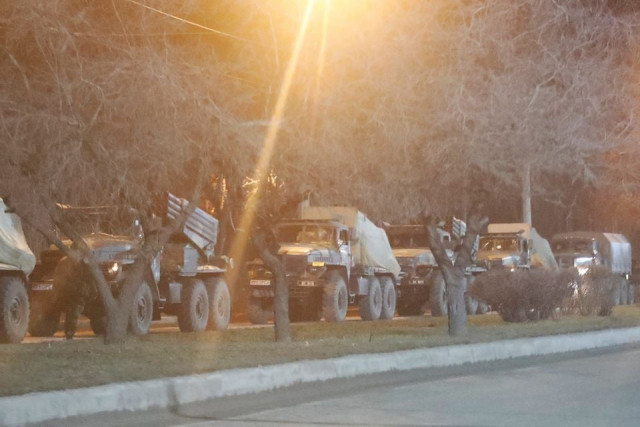
Ukrainian soldiers battled Russian forces on three sides on Thursday after Moscow mounted an assault by land, sea and air in the biggest attack on a European state since World War II after Russian President Vladimir Putin declared war on the immediate neighbour in a pre-dawn televised address.
Explosions and gunfire were heard throughout the morning in Kyiv, as missiles rained down on targets and authorities reported columns of troops pouring across Ukraine’s borders from Russia and Belarus to the north and east, and landing on the southern coasts from the Black Sea and Azov Sea.
Air raid sirens sounded over Kyiv at the break of dawn after the city’s main airport was hit in the first bombing of the city. The city declared an overnight curfew but said underground stations would remain open throughout to serve as bomb shelters.
Attacks targeted Sumy pic.twitter.com/ZYtOWasbS8
— Liveuamap (@Liveuamap) February 24, 2022
Residents of Kharkiv, Ukraine’s second biggest city and close to the Russian border, said windows in apartment blocks were shaking from constant blasts. Blasts could also be heard in the south-eastern port of Mariupol, near a frontline held by Russian-backed separatists in eastern Ukraine.
In the Ukrainian village of Starognativka, also near the frontline where separatists have faced off against Kyiv’s forces, an official said missiles had rained down since the morning and power was out. “They are trying to wipe the village off the face of the earth,” he added.
Fierce fighting was still taking place in the regions of Sumy and Kharkiv in the northeast and Kherson and Odessa in the south, while the highway heading west out of Kyiv was choked with traffic across five lanes as residents fled.
Russian helicopters being shot at by Ukrainian forces around Vyshhorod city in the Kiev Oblast . Flares can be seen deployed. pic.twitter.com/la8dQBa1Re
— CaucasusWarReport (@Caucasuswar) February 24, 2022
As night fell, the picture of what was happening on the ground was sketchy. An adviser to the Ukrainian presidential office said Russian forces captured the Chernobyl nuclear power plant, just 90 kilometres north of the capital, and Hostomel airport in the Kyiv region.
‘Denazification of Ukraine’
The assault brought a calamitous end to weeks of fruitless diplomatic efforts by Western leaders to avert a war. Putin said in a televised address that he did not plan a military occupation, only to disarm Ukraine and purge it of nationalists.
Read: US sanctions Russia after Putin sends troops to Lugansk, Donetsk
Putin stressed that he had ordered “a special military operation” to protect people, including Russian citizens, subjected to “genocide” in Ukraine. “And for this we will strive for the demilitarisation and denazification of Ukraine,” Putin said.
Putin justified the assault as a defence of the self-proclaimed Donetsk and Lugansk republics in eastern Ukraine, which had asked Moscow for military help, and the Russian president recognised their independence on Monday. The regional conflict has dragged on since 2014, killing over 14,000 people.
#BREAKING: Video of Russian cruise missiles flying to targets in Ukraine pic.twitter.com/vSp72Fxphk
— ELINT News (@ELINTNews) February 24, 2022
Russia had massed over 150,000 troops on Ukraine’s borders – the biggest military build-up in Europe since World War II. Ukrainian President Volodymyr Zelenskiy called on the citizens to defend their country and said arms would be given to anyone prepared to fight.
“What we have heard today are not just missile blasts, fighting and the rumble of aircraft. This is the sound of a new Iron Curtain, which has come down and is closing Russia off from the civilised world,” Zelenskiy said.
The Ukrainian president called the attack on Chernobyl—a vast area that has been abandoned because of continued high levels of radioactivity since a nuclear meltdown decades ago —“a declaration of war on all of Europe”.
Dozens killed
Ukraine’s Health Minister Oleh Lyashko said 57 people had been killed and 169 wounded. They included 18 people dead in a missile attack in the south-western Odessa region – the single deadliest strike of the day – and six in Brovary, a town near Kyiv.
Read More: Oil steady as Russia-Ukraine supply fears wane
Ukraine’s ambassador to the United States Oksana Markarova said Ukrainian forces downed two Russian helicopters and seven other Russian aircraft and destroyed several Russian trucks, and a platoon from Russia’s 74th Motor Rifles Brigade had surrendered.
Ukraine’s military said it destroyed four Russian tanks near Kharkiv, killed 50 troops while repulsing attack on a frontline town in Luhansk region, where separatists said that they downed two Ukrainian planes. Russia, however, denied that any of its aircraft or armoured vehicles had been destroyed.
Emergency services said a military plane with 14 people on board crashed south of Kyiv. However, Russian news agency Interfax said a military transport aircraft crashed in Russia’s southern Voronezh region, killing its crew on board. It added the accident could have been caused by a technical failure.
The Ochakov sea port of Ukraine is also destroyed by Russian ballistic missiles. pic.twitter.com/d3pAsvGT4r
— CaucasusWarReport (@Caucasuswar) February 24, 2022
In the capital Kyiv, a city of 3 million, queues of people waited to withdraw money and buy supplies of food and water. Cars stretched for dozens of kilometres on the highway leading west towards Poland, where Western countries have prepared to receive hundreds of thousands of refugees.
Russia’s defence ministry said its forces had “successfully completed” their objectives for the day. It added that over 83 land-based Ukrainian military targets, including 11 airfields, were destroyed on the first day of the operation.
Elsewhere in the region NATO activated “defence plans” for allied countries but alliance chief Jens Stoltenberg said there were no intentions to send forces into Ukraine. In the Baltics, Lithuania declared a national emergency and Latvia banned three Russian TV channels that were broadcasting in the country.
Western sanctions
The attack spooked the global financial markets with stocks plunging and oil prices soaring past $100, and triggered Western warnings of unprecedented economic action against Russia. NATO, G7 and the EU condemned the attack.
British Prime Minister Boris Johnson was the first to unveil a package of “severe” sanctions against Russia, targeting banks, members of President Putin’s closest circle and the extremely wealthy who enjoy high-rolling London lifestyles.
Белгородская обл, 5:30 pic.twitter.com/4UQQQQs8Dy
— IgorGirkin (@GirkinGirkin) February 24, 2022
British officials said that the government would impose an asset freeze on some major Russian banks, including state-owned VTB, its second-biggest bank, and stop major Russian companies from raising finance in Britain.
US President Joe Biden announced severe new sanctions on Russia, freezing assets of major banks and cutting off high-tech exports. He said the steps imposed in coordination with Europe would block top Russian banks from the US financial system and “cut off more than half of Russia’s high-tech imports.”
Biden also said that the leaders of the Group of Seven (G7) industrialised nations had agreed to move forward on “devastating packages of sanctions” and other economic measures to hold Russia accountable.
The US Treasury Department announced another set of sanctions against 24 Belarusian individuals and entities over their support for Moscow’s attack. The sanctions target two state-owned banks, as well as Belarus’ defence and security industries and defence officials.
Russian Mi-24/35M and Mi-28N attack helicopters flying over the Kakhovka Hydroelectric Power Plant on the Dnieper river.https://t.co/cmxqiQs6nK pic.twitter.com/b2sXC9xhGP
— Rob Lee (@RALee85) February 24, 2022
Canadian Prime Minister Justine Trudeau announced further sanctions, targeting 62 individuals and entities, including members of the Russian elite and their family members, as well as the Wagner Group and major Russian banks.
The Council of Europe, of which Russia and Ukraine are both members, said it would consider sanctions against Russia. It said that permanent representatives of its 47 member states would meet on Friday (today) to examine “the measures to be taken in response to [Russia’s] serious violation”.
Meanwhile, the European Union (EU) leaders would impose new sanctions on Russia, freezing its assets, halting its banks’ access to European financial markets and hitting “Kremlin interests” over its invasion of Ukraine, senior officials said.
The continental bloc will also target Russia’s trade, energy and transport, among other sectors, and include export controls in what the EU’s foreign policy chief, Josep Borrell described as “the harshest package of sanctions we have ever implemented”.
However, German Chancellor Olaf Scholz said that cutting off Russia from the SWIFT global interbank payment system should not be part of the second EU sanctions package against Russia that EU leaders would decide upon at a meeting in Brussels.


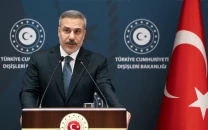
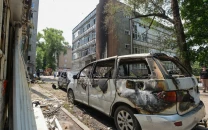
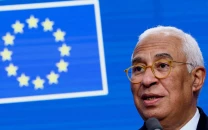
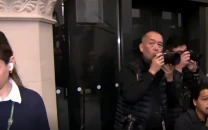













COMMENTS
Comments are moderated and generally will be posted if they are on-topic and not abusive.
For more information, please see our Comments FAQ